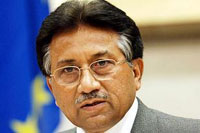Thousands of opponents freed in Pakistan
Pakistan President Gen. Pervez Musharraf yielded to Washington's pressure and released thousands of opponents from jails, rolling back harsh measures taken when he suspended constitution.

But as the general flew off for a sit-down with Saudi leaders in Riyadh, Pakistan's political cauldron continued to boil, with dozens of journalists arrested and newly freed opposition lawyers vowing to keep up their campaign.
Some 3,400 people were released from lockup, among them political activists and lawyers at the forefront of protests against the Pakistani leader before and after he declared emergency rule on Nov. 3, purging the Supreme Court and taking independent television news off the air.
Interior Ministry spokesman Javed Iqbal Cheema said more than 2,000 political opponents who remained behind bars would be released shortly.
"The process has started. More are being released today," he said.
Many high-ranking party activists and leaders, such as former cricket star turned politician Imran Khan and Aitzaz Ahsan, president of the Supreme Court Bar Association, remained in prison. Khan began a hunger strike Monday to protest emergency rule.
The government did not say what prompted the mass release, but it came just days after a visit by U.S. Deputy Secretary of State John Negroponte, who called on Musharraf to end emergency rule and also appealed to opposition leader Benazir Bhutto to avoid an atmosphere of political brinksmanship.
The government "wanted to impress upon (the United States) that they are very keen to hold elections," said Ahsan Iqbal, a leader of the party of exiled former premier Nawaz Sharif.
He said no leaders of Sharif's party had been freed begging the question of how they could file nomination papers and campaign effectively for elections set for Jan. 8.
Sharif and Bhutto have made noises about joining forces to oust Musharraf.
But since Negroponte left, Bhutto has refrained from repeating her most strident statements, such as calling on Musharraf to resign.
Bhutto's party appeared to take another step back on Tuesday, saying the issue of Musharraf's legitimacy as president should be referred to the next parliament. Bhutto had said previously she hoped to see challenges to his rule put back before the Supreme Court once the constitution is restored.
There were also reports of a possible rapprochement in Saudi Arabia, where Musharraf was meeting with King Abdullah, a close ally.
Officials in the kingdom said authorities were trying to arrange a meeting between Musharraf and Sharif, the premier the general ousted when he took power in 1999. They spoke to The Associated Press on condition of anonymity because they were not authorized to talk to the media.
Sharif did not return repeated calls for comment left at his home in the Saudi city of Jeddah, but Iqbal ruled out a meeting. Musharraf would have to agree to a list of conditions including agreeing to leave power before talks with Sharif would make any sense, Iqbal said.
If Musharraf had hoped his newly freed opponents would give up their campaign, he was disappointed. Leaders of Pakistan's lawyers' associations vowed immediately after their release to press on until the constitution was restored and judges ousted by Musharraf reinstated.
"We are chalking out a strategy for the next phase. ... The lawyers community will not give up," said Hafiz Lakho, a senior lawyer in Karachi.
In the southern province of Sinned, authorities released 300 people, including lawyers, human rights activists and supporters of Bhutto. She was released from a second stint under house arrest late last week.
"All the political workers and lawyers who were detained ... are being released," a senior provincial official, Ghulam Mohammed Mohtarem, said of the Sindh releases. "We had instructions from the chief minister to release these people."
He added that others he wouldn't say how many remain in jail in the province, including 11 people charged with sedition since emergency rule was imposed on Nov. 3.
In neighboring Baluchistan, 49 lawyers and six political activists were set free, said Rehmatullah Niazi, a senior police officer in Quetta, the provincial capital. Three other lawyers remain in custody.
The release of political opponents in Pakistan came hours after judges handpicked by Musharraf quashed legal challenges to his disputed re-election as president. Critics have denounced the decision as illegitimate and insisted that Musharraf relinquish power to end the country's political turmoil.
While some people were being ushered out of detention facilities, others were being led in.
In the southern city of Karachi, police detained about 150 journalists Tuesday after clashing with them during a protest against the state of emergency, witnesses said. Two reporters were seen bleeding from head injuries.
Police also detained 23 journalists after they tried to hold a rally in the southern city of Hyderabad to protest press restrictions, said Ali Hassan, a local journalist who was present at the rally.
Subscribe to Pravda.Ru Telegram channel, Facebook, RSS!


